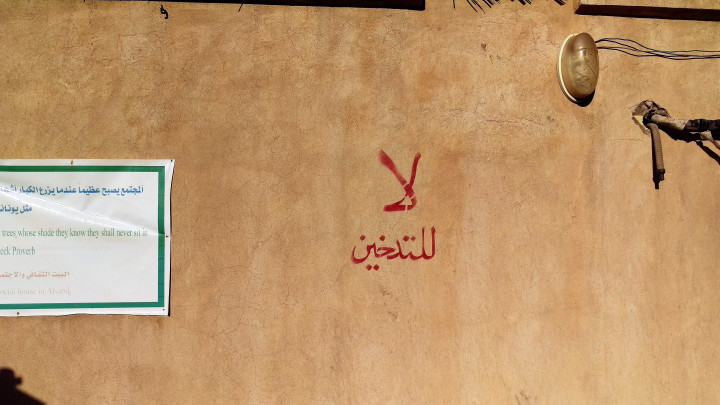From smoking to biking
The transformation of Al-Bunahidh
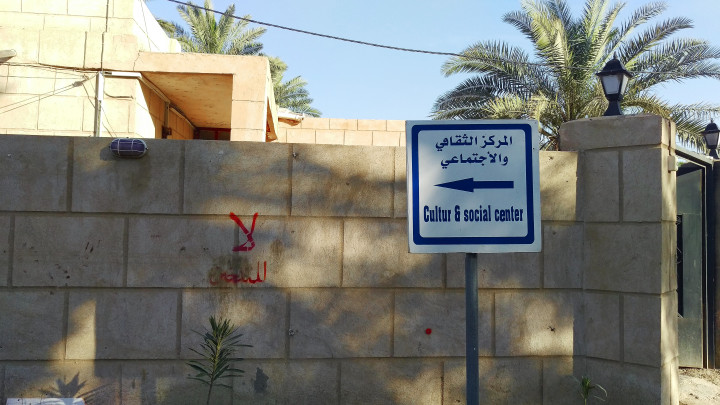
Heavy smoking, politics and chai – an Iraqi ritual for any occasion. In the village of Al-Bunahidh in central Iraq, decade after decade, people would gather in al-mudheef, the village guest hall, to chatter away with their chais in hand, late into the evening hours. As for cigarettes – well, it felt as though every boy and his grandma would light one up several times a day. Then, things changed.
Smoking is nothing new in Iraq, quite the contrary. What is more recent is the cheap access to cigarettes, where a pack of smokes would cost about the same as a couple of candy bars. For young and pre-teen Iraqis, it became easy to pick up the habit of their parents and elders, spending only a bit of their pocket money.
“Are you in love? You can be without smoking!”
When a man from Al-Bunahidh saw that, he started a dialogue with the young smokers around him. He used his wit and charm to try and convince them that smoking was not a necessity.
“Are you in love?” he would ask them. “You can be without smoking!”
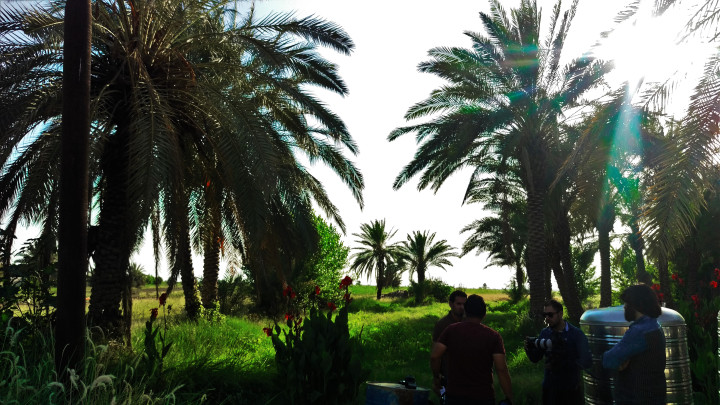
The man’s approach was to befriend and create a caring relationship with the youth. And it worked, says Kadhum Hasson, who is the son of the late man in the story.
Upon returning to Al-Bunahidh after two decades away, Kadhum Hasson noticed that all the work his father did was starting to come undone. Once again, young people were smoking, and they felt demotivated by the dire situation in Iraq. Seeing this, Kadhum Hasson decided to get to work. He began thinking of the role that the village guest hall played in Al-Bunahidh. It was the central meeting point, the heart of the village, and seemed like a good place to grab the attention of its frequent visitors.
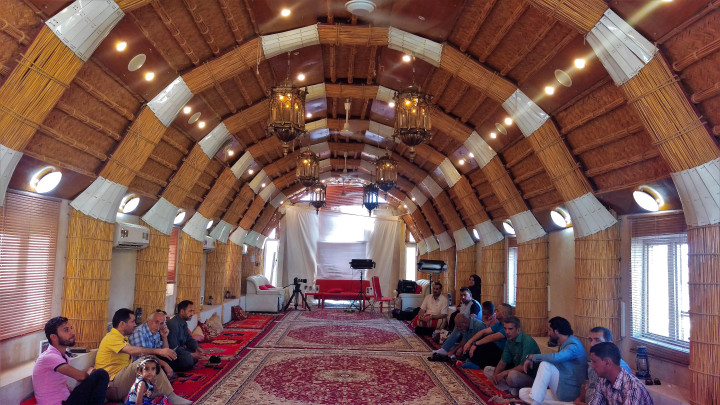
To continue his father’s legacy, instead of resorting to the usual aggressive and graphic advertising, Kadhum Hasson decided to engage respectfully with the other villagers and start establishing non-smoking zones. The guest hall became one of the first. Eventually, the non-smoking zones came to cover the whole village. Some vendors even stopped stocking cigarettes. Kadhum Hasson had built a new support network, made up by elders and fellow villagers, through which he could gently introduce new ideas.
Kadhum Hasson decided to engage respectfully with the other villagers and start establishing non-smoking zones.
Through this cooperation, a cultural and social centre was established. The cohesion of the village was key to making this happen.
“What can I do with an empty house? What can a king do without a kingdom?” says Kadhum Hasson.
His vision for Al-Bunahidh is of a green and prosperous village, insulated from the toxic atmosphere of politics, religious debates and pollution. Several rules to preserve the village unity have been declared and agreed upon by the elders: just like at a polite dinner conversation, politics and controversy are discouraged; caring for the environment, planting trees and celebrating the World Environment Day – a day that goes by ignored throughout the rest of Iraq – are invited.
“No one runs except the ones we call crazy – and I became that crazy person who ran seven kilometres a day.”
With the establishment of the centre, community initiatives became a priority in Al-Bunahidh. In the spirit of health, sporting events were introduced. Kadhum Hasson had seen a cycling event while visiting Tripoli in Lebanon, which inspired him to create the Al-Bunahidh Bike Festival. Physical activity became a community health initiative, as did awareness about sugary drinks.
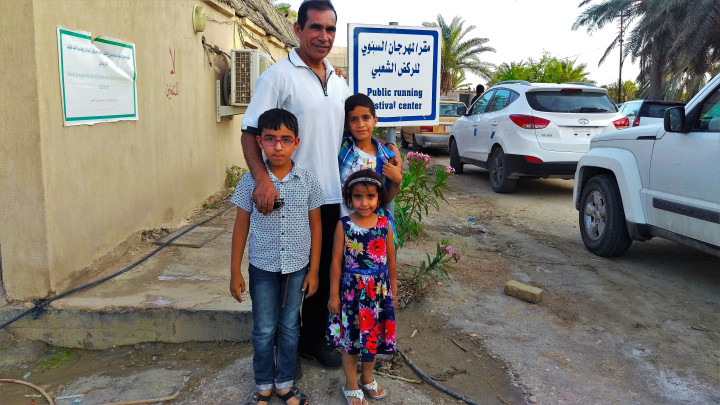
“No one runs except the ones we call crazy – and I became that crazy person who ran seven kilometres a day,” says Kadhum Hasson.
The public running festival changed perceptions of running in the village: almost everyone showed up to watch or take part, and people got a sense of understanding the importance of daily physical activity.
Talking to Kadhum Hasson about cycling and running, it struck me as impossible to see an Iraqi woman running or biking in public. The taboos associated with public activity of women are far too malignant, and I was squirming to know what Al-Bunahidh’s women got out from all of this.
Kadhum Hasson smiled and lowered his voice to an almost whisper.
“Don’t forget: we are in a village, and a village in Iraq”.
First, my heart sank with those words. But then he continued:
“Being in a village in Iraq means that there needs to be some special arrangements for women. That’s why we’ve allocated two days a week where the entire centre is for women only.”
The taboos associated with public activity of women are far too malignant, and I was squirming to know what Al-Bunahidh’s women got out from all of this.
Far from ideal, was my initial reaction. But considering the context, it was a great idea. Perhaps with a growing interest from Al Bunahidh’s women, the number of women-only days could increase – or better yet, a mixed gender event could occur.
The reason I had come to Al-Bunahidh in the first place was a special event for The Green Library, a public library project where anyone can come to the cultural and social centre to read and borrow books. The library was another of Kadhum Hasson’s ideas to encourage young people to read, write and express themselves creatively.
“There’s no manager to this project,” he said, “everyone is the manager.”
With a belief in the encouragement of youth to read and form leadership skills, The Green Library functions as a creative space for poets, writers and painters, especially those in their teens.
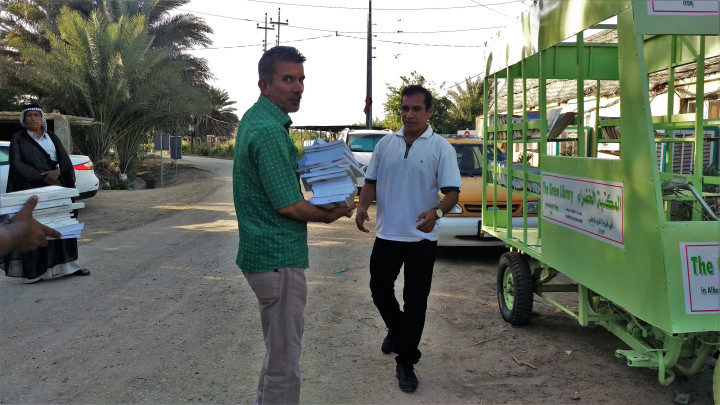
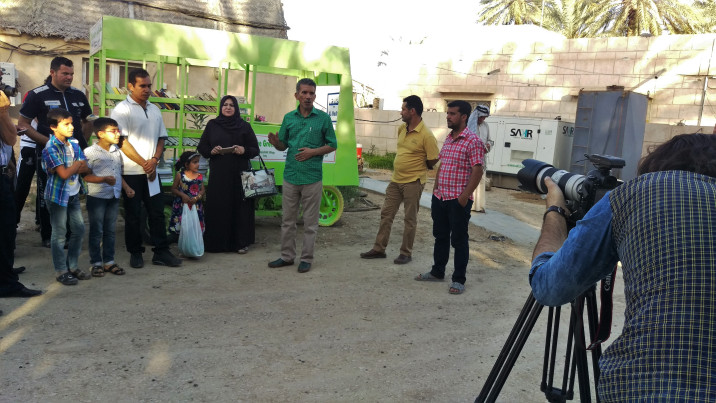
When the Art and Culture Palace of Diwaniya, a state gallery and theatre in Al-Qadisiyya district, heard about the library, they mounted their trucks with donated books and magazines and headed to the village. The palace, which holds regular events for musicians, painters and writers, wanted to support Al-Bunahidh and bring both donations and media attention to the village.
Kadhum Hasson and the people of Al-Bunahidh are an example of having transformed a dire situation into one of hope and possibility.
But building support and encouraging youth and artists in Iraq is not an easy task. There is in many places a stigma associated with art; there is corruption and a lack or resources (a group of teachers told me for instance that they had to make do with old and second hand books after a shipment coming their way had been destroyed by Daesh). Many people are left uncertain about the future, falling into nihilistic thoughts. In opposition to that, Kadhum Hasson and the people of Al-Bunahidh are an example of having transformed a dire situation into one of hope and possibility.
